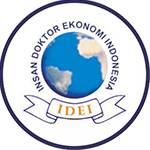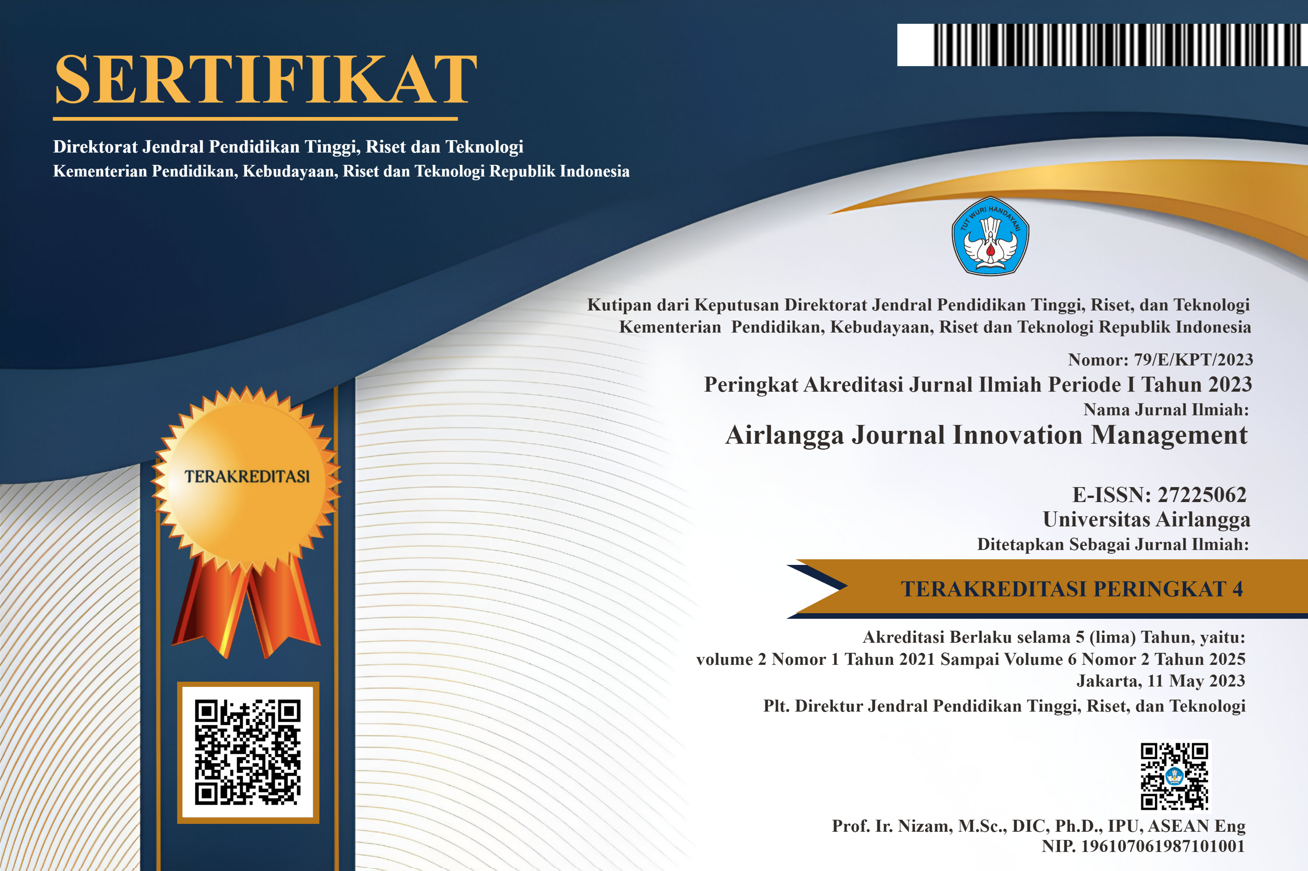DETERMINANTS OF THE INTENTION TO PARTICIPATE IN WAQF: ALTRUISM, TRUST, AND RELIGIOSITY
Unduhan
Studi ini bertujuan untuk mencari tahu perilaku kelompok masyarakat untuk berpartisipasi dalam wakaf. salah satu motif yang harus ditangkap oleh pemasar wakaf adalah perilaku altruistik dalam wakaf. Altruisme didefinisikan sebagai perasaan ingin mensejahterakan orang lain sehingga terkadang kepentingan pribadi tidak selalu penting. Perasaan orang yang selalu ingin membantu orang lain ini harus dilihat dan dikonversi menjadi salah satu marketing tools dikemudian hari. Religiusitas diusulkan sebagai moderasi sifat altruistic seseorang dalam berpartisipasi dalam wakaf. Studi ini menggunakan Partial Least Square – Structural Equation Model (PLS-SEM) model, dengan total 61 pewakaf aktif di Indonesia. Temuan utama mengungkapkan bahwa altruisme secara signifikan mempengaruhi kepercayaan, meskipun tidak mempengaruhi niat berpartisipasi dalam wakaf. Hasil signifikan lainnya mengungkapkan bahwa religiusitas Islam memoderasi pengaruh altruisme terhadap intensi untuk berpartisipasi dalam wakaf jika pelanggan (wakif) telah merasa percaya. Dalam hal ini, seseorang dengan tingkat religiusitas yang lebih tinggi memiliki intensi yang lebih besar untuk berpartisipasi dalam wakaf dibandingkan dengan yang religiusitasnya lebih rendah. Kontribusi signifikan dari penelitian ini adalah teori yang berkembang tentang hubungan antara sikap altruistik, kepercayaan, dan intention to participate on waqf. Studi ini juga menawarkan rekomendasi kepada praktisi dalam membuat strategi pemasaran (segmentation-targeting-positioning) yang menggunakan customer journey pada program yang terlihat altruistik dan religius. Program marketing tersebut disusun dalam rangka mencari ketertarikan calon wakif baru sekaligus membuktikan kredibilitas sehingga akan mendapatkan kepercayaan dan pada akhirnya akan meningkatkan intensi seseorang untuk berpartisipasi dalam wakaf.
Ab Shatar, W. N., Hanaysha, J. R., & Tahir, P. R. (2021a). Determinants of cash waqf fund collection in Malaysian Islamic banking institutions: empirical insights from employees' perspectives. ISRA International Journal of Islamic Finance, 13(2), 177–193. https://doi.org/10.1108/IJIF-06-2020-0126
Ab Shatar, W. N., Hanaysha, J. R., & Tahir, P. R. (2021b). Determinants of cash waqf fund collection in Malaysian Islamic banking institutions: empirical insights from employees' perspectives. ISRA International Journal of Islamic Finance, 13(2), 177–193. https://doi.org/10.1108/IJIF-06-2020-0126
Adhiatma, A., & Fachrunnisa, O. (2021). The Relationship among Zakat Maal, Altruism and Work Life Quality. International Journal of Zakat, 6(1), 71–94. https://doi.org/10.37706/ijaz.v6i1.255
Ascarya, Rahmawati, S., & Sukmana, R. (2017). Cash waqf models of BMT in Indonesia. In Al-Awqaf: Jurnal Wakaf dan Ekonomi Islam (Vol. 10, pp. 115–126).
Baqutayan, S. M. S. (2020). What determine the givers behavior? The mindset of waqf giver in Malaysia. Sociology International Journal, 4(1), 17–23.
Cao, X., Yu, L., Liu, Z., Gong, M., & Adeel, L. (2018). Understanding mobile payment users' continuance intention: a trust transfer perspective. Internet Research.
Cooper, D. R., Schindler, P. S., & Sun, J. (2014). Business research methods. Business research methods. New York, NY: McGraw-Hill/Irwin.
Diebner, R., Silliman, E., Ungerman, K., & Vancauwenberghe, M. (2020). Adapting customer experience in the time of coronavirus. McKinsey & Company, 2.
Eisenberg, N., Miller, P. A., Schaller, M., Fabes, R. A., Fultz, J., Shell, R., & Shea, C. L. (1989). The role of sympathy and altruistic personality traits in helping: A reexamination. Journal of Personality, 57(1), 41–67.
Faizi, R. N., Lubis, D., & Mahanani, Y. (2021). Determinant of Cash Waqf Donation in DKI Jakarta. Badan Wakaf Indonesia.
Faruq, H. A. (2011). How institutions affect export quality. Economic Systems, 35(4), 586–606.
Haidlir, B. M., Laksmono, B. S., Kasri, R. A., Azizon, A., & Hartono, D. (2021). Public Behaviour on Cash Waqf: Evidence from Indonesia. Jejak, 14(2), 316–332. https://doi.org/10.15294/jejak.v14i2.32032
Hair Jr, J. F., Sarstedt, M., Hopkins, L., & Kuppelwieser, V. G. (2014). Partial least squares structural equation modeling (PLS-SEM): An emerging tool in business research. European business review.
Hasan, S. (2011, December). Role of waqf in enhancing Muslim small and medium enterprises (SMES) in Singapore. In 8th International Conference on Islamic Economics and Finance, Qatar (pp. 1-50).
Hazami, B. (2016). Peran dan aplikasi wakaf dalam mewujudkan kesejahteraan umat di Indonesia. Analisis: Jurnal Studi Keislaman, 16(1), 173–204.
Kasdi, A. (2018). Dinamika Pengelolaan Wakaf di Negara-Negara Muslim. ZISWAF: Jurnal Zakat Dan Wakaf, 4(1), 73–86.
Kashif, M., Zarkada, A., & Thurasamy, R. (2017). The moderating effect of religiosity on ethical behavioural intentions: An application of the extended theory of planned behaviour to Pakistani bank employees. Personnel Review.
Khuwarazmi, A., Mulyani, S. S., & Insani, A. M. (2021). Analysis Of Community Cash Waqf Intention To Support Sustainable Development Goals (SDGs): Theory Planned Behaviour Approach. Airlangga International Journal of Islamic Economics and Finance, 4(1). https://doi.org/10.20473/aijief.v4i1.26383
Kline, B., & Tamer, E. (2016). Bayesian inference in a class of partially identified models. Quantitative Economics, 7(2), 329-366.Malhotra, N. K. (2015). Essentials of marketing research: A hands-on orientation. Pearson Essex.
Mansbridge, J. J. (1990). Beyond self-interest. University of Chicago Press.
Meer, J. (2014). Effects of the price of charitable giving: Evidence from an online crowdfunding platform. Journal of Economic Behavior & Organization, 103, 113–124.
Mukhtar, A., & Butt, M. M. (2012). Intention to choose Halal products: The role of religiosity. Journal of Islamic Marketing, 3(2), 108–120. https://doi.org/10.1108/17590831211232519
Pitchay, A. A., Thaker, M. A. M. T., Mydin, A. A., Azhar, Z., & Latiff, A. R. A. (2018). Cooperative-waqf model: a proposal to develop idle waqf lands in Malaysia. ISRA International Journal of Islamic Finance.
Qolbi, A., & Sukmana, R. (2022). Determinan Niatan Mahasiswa Terhadap Wakaf Tunai Secara Online Menggunakan Modifikasi Technology Acceptance Model. Jurnal Ekonomi Syariah Teori Dan Terapan, 9(1), 78. https://doi.org/10.20473/vol9iss20221pp78-91
Qurrata, V. A., Seprillina, L., Narmaditya, B. S., & Hussain, N. E. (2020). Media promotion, Islamic religiosity and Muslim community perception towards charitable giving of cash waqf. International Journal of Monetary Economics and Finance, 13(3), 296–305.
Rodriguez-Ricardo, Y., Sicilia, M., & López, M. (2019). Altruism and internal locus of control as determinants of the intention to participate in crowdfunding: the mediating role of trust. Journal of Theoretical and Applied Electronic Commerce Research, 14(3), 1–16.
Sargeant, A., & Lee, S. (2004). Trust and relationship commitment in the United Kingdom voluntary sector: Determinants of donor behavior. Psychology & Marketing, 21(8), 613–635.
Shukor, S. A., Anwar, I. F., Aziz, S. A., & Sabri, H. (2017). Muslim attitude towards participation in cash waqf: Antecedents and consequences. International Journal of Business and Society, 18(S1), 193–204.
Soemitra, A. (2010). Bank dan lembaga keuangan syariah.
Song, Y., Wu, H., Ma, J., & Lu, N. (2019). Exploring the dynamic influences and interaction effects of signals on backers' investment in the crowdfunding market. Information Technology & People.
Susanto, A., Suharyono, S., Musadieq, M., & Iqbal, M. (2021). Determinant Factors of Donation Intention and the Role of Religiosity: A Case Study in Indonesia. The Journal of Asian Finance, Economics and Business, 8(5), 1155–1169. https://doi.org/10.13106/jafeb.2021.vol8.no5.1155
Sutarso, Y. (2022). The Role of Islamic Religiosity on the Relationship Between Risk , Trust , and Intention to Use Digital Payments During the COVID-19 Pandemic. International Journal of Islamic Economics and Finance (IJIEF), 5(July), 177–200.
Syafira, F. N., Ratnasari, R. T., & Ismail, S. (2020). the Effect of Religiosity and Trust on Intention To Pay in Ziswaf Collection Through Digital Payments. Jurnal Ekonomi Dan Bisnis Islam (Journal of Islamic Economics and Business), 6(1), 98. https://doi.org/10.20473/jebis.v6i1.17293
Syahrir, A., Rahem, A., & Prayoga, A. (2020). Religiosity of pharmacy students of UIN Malang during COVID-19 pandemic. Journal of Halal Product and Research (JPHR), 3(1), 25–34.
Tan, M., & Teo, T. S. H. (2000). Factors influencing the adoption of Internet banking. Journal of the Association for Information Systems, 1(1), 5.
Taylor, S. E., Van Lange, P., Kruglanski, A. W., & Higgins, E. T. (2012). Handbook of theories of social psychology.
Utomo, H. S. (2020). The effect of Muslim religiosity and innovation capability on firm survival: A study on small enterprises during the Covid-19 pandemic. Iqtishadia, 13(2), 179–196.
Zauro, N. A., Saad, R. A. J., Ahmi, A., & Hussin, M. Y. M. (2020). Integration of Waqf towards enhancing financial inclusion and socio-economic justice in Nigeria. International Journal of Ethics and Systems.

Artikel ini berlisensiCreative Commons Attribution-NonCommercial-ShareAlike 4.0 International License.
- The journal allows authors to hold copyright without restrictions and retain publication rights without restrictions. The author retains the copyright and grants the first publication rights to the journal, with his work simultaneously licensed under the Creative Commons Attribution-NonCommercial-ShareAlike 4.0 International License (CC BY-NC-SA). This license allows others to share the work with acknowledgment of authorship and initial publication in this journal, provided that the work is not used for commercial purposes and that any derivative works must use the same license.
- Authors may enter into additional contractual agreements for non-exclusive distribution of the journal publication version (e.g., uploading it to an institutional repository or publishing it in book form), while still including acknowledgment of the initial publication in this journal.
- Authors are allowed and encouraged to upload their work online (e.g., in an institutional repository or personal website) before and during the submission process. This can support productive scientific exchanges as well as increase citations to published works.

AJIM by UNAIR is licensed under a Creative Commons Attribution-NonCommercial-ShareAlike 4.0 International License.





















